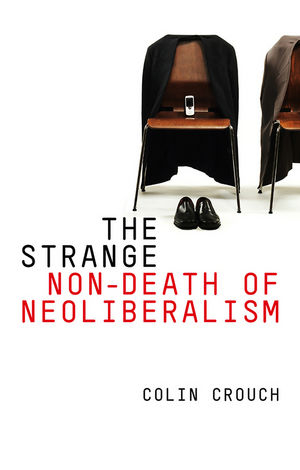
The Strange Non-death of Neo-liberalism
Seiten
2011
Polity Press (Verlag)
978-0-7456-5221-4 (ISBN)
Polity Press (Verlag)
978-0-7456-5221-4 (ISBN)
The financial crisis seemed to present a fundamental challenge to neo liberalism, the body of ideas that have constituted the political orthodoxy of most advanced economies in recent decades. This title deals with neo liberalism seems to be about free markets, in practice it is concerned with dominance over public life of the giant corporation.
The financial crisis seemed to present a fundamental challenge to neo liberalism, the body of ideas that have constituted the political orthodoxy of most advanced economies in recent decades. Colin Crouch argues in this book that it will shrug off this challenge. The reason is that while neo liberalism seems to be about free markets, in practice it is concerned with the dominance over public life of the giant corporation. This has been intensified, not checked, by the recent financial crisis and acceptance that certain financial corporations are ‘too big to fail'. Although much political debate remains preoccupied with conflicts between the market and the state, the impact of the corporation on both these is today far more important. Several factors have brought us to this situation:
The lobbying power of firms whose donations are of growing importance to cash-hungry politicians and parties
The weakening of competitive forces by firms large enough to shape and dominate their markets
The moral initiative that is grasped by enterprises that devise their own agendas of corporate social responsibility
Both democratic politics and the free market are weakened by these processes, but they are largely inevitable and not always malign. Hope for the future, therefore, cannot lie in suppressing them in order to attain either an economy of pure markets or a socialist society. Rather it lies in dragging the giant corporation fully into political controversy.
The financial crisis seemed to present a fundamental challenge to neo liberalism, the body of ideas that have constituted the political orthodoxy of most advanced economies in recent decades. Colin Crouch argues in this book that it will shrug off this challenge. The reason is that while neo liberalism seems to be about free markets, in practice it is concerned with the dominance over public life of the giant corporation. This has been intensified, not checked, by the recent financial crisis and acceptance that certain financial corporations are ‘too big to fail'. Although much political debate remains preoccupied with conflicts between the market and the state, the impact of the corporation on both these is today far more important. Several factors have brought us to this situation:
The lobbying power of firms whose donations are of growing importance to cash-hungry politicians and parties
The weakening of competitive forces by firms large enough to shape and dominate their markets
The moral initiative that is grasped by enterprises that devise their own agendas of corporate social responsibility
Both democratic politics and the free market are weakened by these processes, but they are largely inevitable and not always malign. Hope for the future, therefore, cannot lie in suppressing them in order to attain either an economy of pure markets or a socialist society. Rather it lies in dragging the giant corporation fully into political controversy.
COLIN CROUCH is Professor of Governance and Public Management at Warwick Business School, Fellow of the British Academy, and expert consultant to the Directorate for Public Governance and Territorial Development, OECD. His previous publications include Post-Democracy.
Acknowledgements vi
Preface vii
About this Book xi
1 The Previous Career of Neoliberalism 1
2 The Market and Its Limitations 24
3 The Corporate Takeover of the Market 49
4 Private Firms and Public Business 71
5 Privatized Keynesianism: Debt in Place of Discipline 97
6 From Corporate Political Entanglement to Corporate Social Responsibility 125
7 Values and Civil Society 144
8 What's Left of What's Right? 162
References 181
Further Reading 184
Index 187
| Erscheint lt. Verlag | 24.6.2011 |
|---|---|
| Verlagsort | Oxford |
| Sprache | englisch |
| Maße | 137 x 213 mm |
| Gewicht | 295 g |
| Themenwelt | Sachbuch/Ratgeber ► Geschichte / Politik ► Allgemeines / Lexika |
| Geisteswissenschaften ► Geschichte ► Allgemeines / Lexika | |
| Geisteswissenschaften ► Geschichte ► Regional- / Ländergeschichte | |
| Sozialwissenschaften ► Politik / Verwaltung ► Politische Systeme | |
| Sozialwissenschaften ► Politik / Verwaltung ► Politische Theorie | |
| ISBN-10 | 0-7456-5221-2 / 0745652212 |
| ISBN-13 | 978-0-7456-5221-4 / 9780745652214 |
| Zustand | Neuware |
| Haben Sie eine Frage zum Produkt? |
Mehr entdecken
aus dem Bereich
aus dem Bereich
die Reise der Menschheit : zwischen Aufbruch und Scheitern
Buch | Softcover (2023)
Ullstein Taschenbuch Verlag
14,99 €


